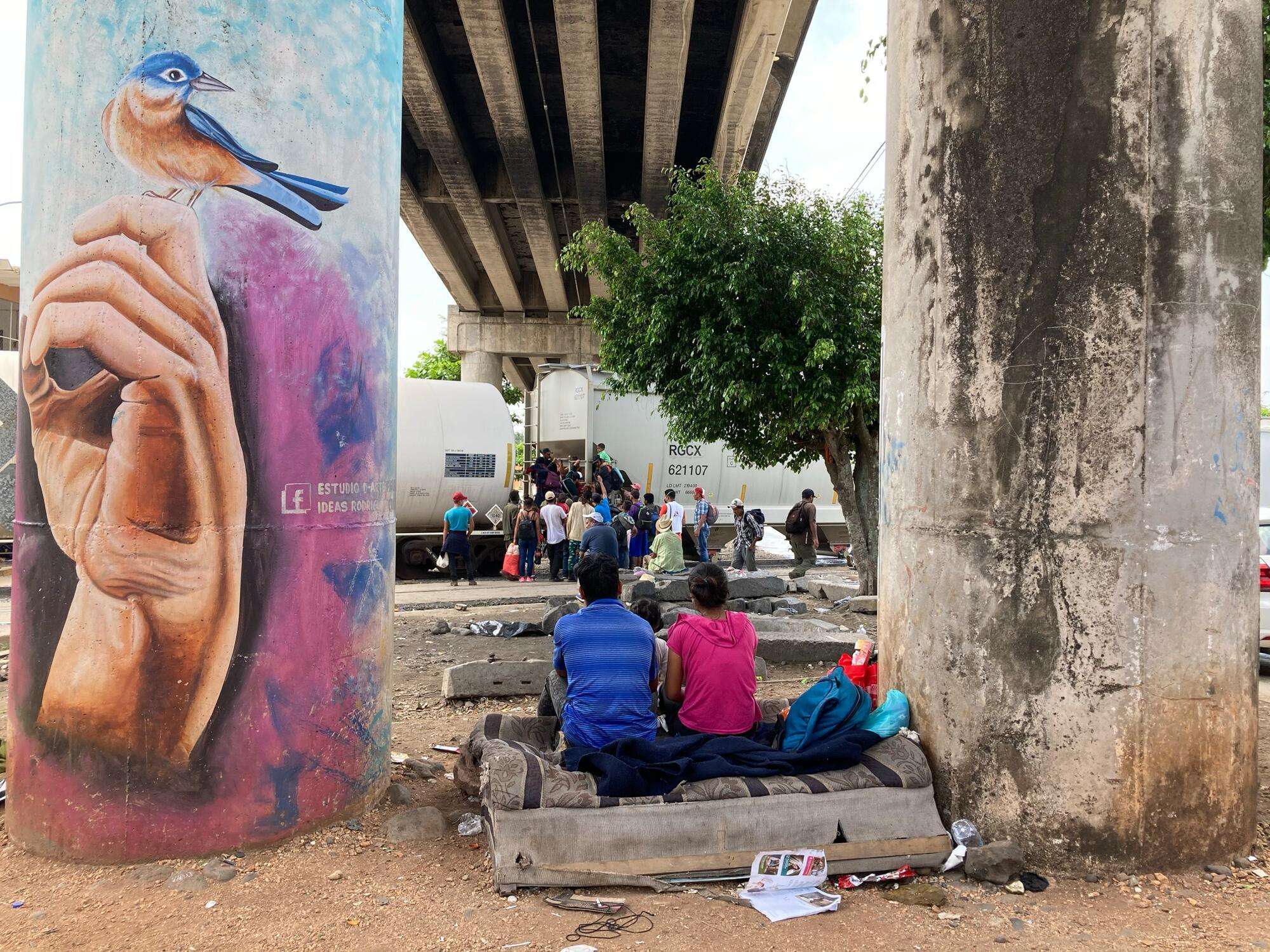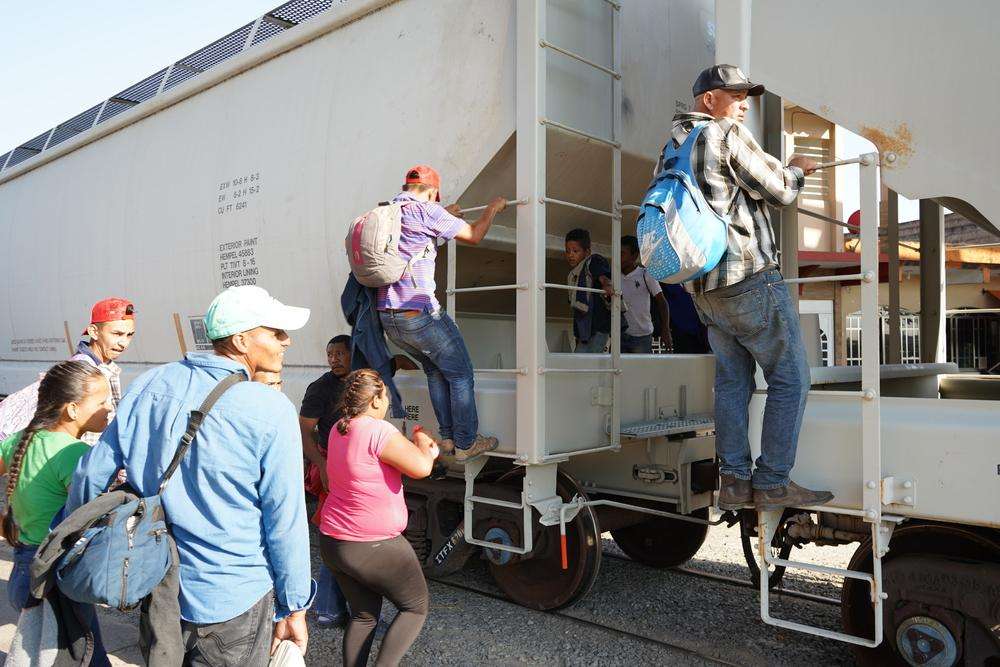Harsh migration policies by the United States, Mexico, Honduras, and Guatemala leave people on the move more exposed to the double threats posed by organized crime and COVID-19, said the international medical humanitarian organization Doctors Without Borders/Médecins Sans Frontières (MSF) today. MSF is witnessing the impact of the criminalization of migration and increasing militarization of borders, likely related to pressure and influence by the US on countries in the region.
MSF medical teams are treating people affected by repeated raids and arbitrary detentions on the southern border of Mexico. They are also seeing asylum seekers who were forced back to Mexico by the US under the Title 42 order, which has been misused to authorize mass expulsions ostensibly for public health reasons related to the COVID-19 pandemic. These Title 42 expulsions effectively block the right to seek asylum in the US.
“Once again we are seeing the construction of physical, bureaucratic, and security walls to block asylum and stop the free movement of people fleeing violence in their countries of origin,” said Antonino Caradonna, coordinator of MSF's migration project in the country. “This is evident both on the northern and southern borders of Mexico. While the United States immediately blocks and expels newcomers en masse, Mexico represses and detains them en masse.”
MSF teams on Mexico’s southern border have repeatedly denounced the mass raids and arbitrary arrests in areas with a high concentration of migrants and asylum seekers, including near the organization's healthcare posts. There have been several incidents in Coatzacoalcos, in the southern state of Veracruz, a railway hub that is widely used by people on the move.
“In fact, last week, raids were carried out in Coatzacoalcos on the railway tracks, and around 50 migrants, including families with children, were arbitrarily detained,” said Caradonna. “They were sleeping near the shelter because they are being denied accommodation.” Many shelters in Mexico have shut down or reduced capacity due to the pandemic.
Police action near shelters or places where migrants receive medical and humanitarian assistance “pushes people in transit to hide more, to opt for more dangerous routes, to be more vulnerable to organized crime and extortion,” said Caradonna. “We have to denounce the extreme lack of protection for these people.”
The testimonies collected by MSF in the area corroborate the increase in raids and arrests on Mexico’s southern border, which put the physical and mental health of asylum seekers and migrants at risk.
“About 400 people came through the mountains, but in the raid they caught about 200. Half were women and the other half were men,” explained Levi, from Honduras. “Now very few women come. They are the ones who get caught the most, because [they travel] with children, they are the ones who run the least.” Levi also described the lack of adequate shelter: “We have stayed in the hills and on the roads because we have not found any shelters or houses for migrants.”
“It has been 20 days since I entered Mexico,” said Kimberly, a 29-year-old Honduran woman who is traveling with her 11-year-old son, a brother and his children. “We have slept in the fields. We have endured hunger and sleepless nights because we have no money. At the Coatzacoalcos shelter, they told us that it was closed. They gave us food and coffee, but it was no longer possible to sleep inside.”
Kimberly used to work in the fields, but lost everything after the recent hurricanes that hit Honduras. “I am afraid of staying on the street because anything can happen to us,” she said. “I am afraid that my son will be taken from me. I have not been able to sleep. I don't sleep because while my son sleeps, I keep watch.”
Others said they received some help from local residents. “There are no shelters, only humanitarian people who shelter us, without any problem, in their homes. And you appreciate that because you no longer have to take the risk of sleeping in the hills,” said Roger, a 39-year-old Honduran man.
Along Mexico’s northern border, MSF teams are witnessing the increase in mass expulsions from the US of asylum seekers and migrants under the Title 42 order. These individuals are returned to Mexico without due process to unfamiliar and often dangerous cities along the northern border. In Reynosa, Nuevo Laredo and Ciudad Juárez, MSF teams have provided medical assistance to hundreds of deported families, now stranded, awaiting protection.
“Our teams give an account of the inhumane treatment migrants receive in detention centers in the US, the impact it has on their health, and the acute stress they carry with them,” said Geaninna Ramos, MSF medical adviser. “They are being deported to border cities in Mexico, without any information about where they are and what they are going to do next. There are many women with children in their arms, who haven't eaten or received dignified treatment while in detention, and without COVID-19 prevention measures in place. We treated a 4-year-old girl who arrived in Ciudad Juárez dehydrated, because she was not even given water in the [holding] cells in the United States.”
“I had entered through the Reynosa border crossing, and they sent me back to Nuevo Laredo,” said María, a 33-year-old Guatemalan woman traveling with her 4-year-old daughter. “I had no way of communicating with anyone.”
She was separated from her husband and son, who are together in a shelter in Monterrey. “Immigration officers treat you badly,” she said. “You ask a question and they yell at you, they push you. To search the minors, they put them all against the bus with their hands up and pushed them. I thought about my son. I did not want to think that my son would be beaten, because I saw how they pushed them around to search them. They treat us badly. We are fleeing and we have no intention of harming anyone, but I don't think everyone understands that.”
The lack of protection for asylum seekers and migrants, the lack of adequate humanitarian assistance, the lack of inclusion in COVID-19 prevention efforts, the criminalization of people forced to flee, their vulnerability to criminal gangs that engage in kidnapping, extortion and trafficking—these are not new problems.
“We have seen these harmful migration policies in the past,” said Caradonna. “We know that they do not discourage migrants, but only push them to hide and go down more dangerous roads, where they may be more exposed to organized crime, turn to human traffickers and risk their lives.”
As stated earlier this month by a spokesperson for the US administration, the increased security presence in the region is intended to deter migration: “The objective is to make it more difficult to make the journey, and make crossing the borders more difficult.”
“We have to be clear and look deeply at these policies,” said Caradonna. “Making the journey more difficult for migrants means making it more lethal.”
MSF once again calls on the US, Mexico, and other governments in the region to end these repressive migration policies. Asylum seekers and migrants must be guaranteed protection and adequate humanitarian assistance in accordance with domestic and international laws and norms. In the context of the COVID-19 pandemic, efforts must be made to protect migrants from the virus through the provision of sufficient shelters and safe spaces.





